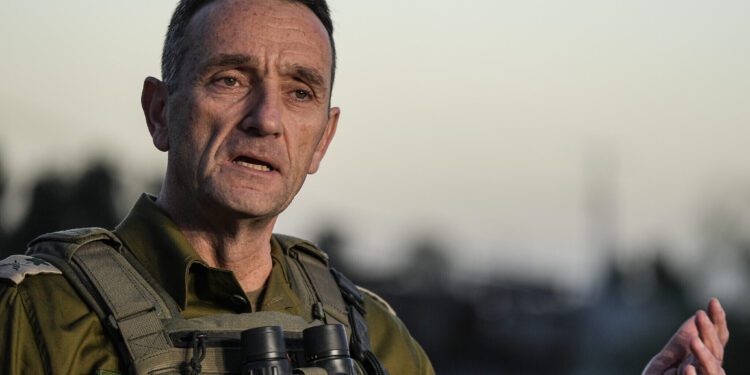In a development that could significantly reshape Israel’s military leadership, Chief of Staff Herzi Halevi reportedly plans to step down from his position by the end of December 2024. This decision, as reported by Israel’s Channel 12 broadcaster, comes in the wake of the Israeli military’s widely criticized failure to prevent and effectively respond to the Hamas attack on October 7, 2023. Halevi’s potential resignation is not an isolated incident but part of a broader pattern of high-ranking military and intelligence officials departing their posts in the aftermath of one of Israel’s most significant security breaches in recent history.
The Context of Halevi’s Decision
Herzi Halevi’s reported intention to resign is deeply rooted in the events of October 7, 2023, when Hamas launched a surprise attack on Israeli territory. This attack, which caught the Israeli military off guard, resulted in significant casualties and hostage-taking, leading to widespread criticism of the country’s defense apparatus. The failure to anticipate and adequately respond to this attack has been a source of intense scrutiny and soul-searching within Israel’s military and intelligence communities.
Halevi’s decision to set a December deadline for his resignation appears to be strategically timed. By the end of 2024, it is expected that Israel will have completed its investigations into the army’s failure to thwart the Hamas attack. This timing suggests that Halevi intends to see through the immediate crisis and the investigation process before stepping down, potentially allowing for a more orderly transition of leadership.
A Wave of Resignations in Israel’s Defense Establishment
Halevi’s reported plans are part of a larger trend of resignations among top Israeli defense officials. This wave of departures underscores the depth of the crisis triggered by the October 7 events and the subsequent ongoing conflict in Gaza. Among the notable resignations:
1. Brigadier General Yossi Sariel, commander of the intelligence Unit 8200, recently announced his resignation.
2. Brigadier General Avi Rosenfeld, the Gaza Division commander, stepped down.
3. The head of the Shin Bet security agency’s Southern District resigned.
4. An intelligence officer in the Gaza division also left their post.
5. Major General Aharon Haliva, head of the Military Intelligence Directorate, resigned in April 2024.
6. Brigadier General Amit Saar, head of the Military Intelligence Directorate’s Research Division, stepped down in February 2024.
These resignations reflect a recognition of the systemic failures that led to the October 7 attack and the subsequent challenges in responding to it.
Reportedly Plans: Implications for Israel’s Military Future
As Halevi reportedly plans his exit, the implications for Israel’s military future are significant. The potential change in leadership comes at a critical time for the Israel Defense Forces (IDF). According to the Channel 12 report, by the end of December, the Israeli army is expected to have completed its preparations for a possible all-out war with Lebanon. This suggests that Halevi’s resignation, if it occurs, will coincide with a period of heightened military readiness and strategic planning.
The timing of these preparations and Halevi’s potential departure raises questions about the continuity of military strategy and leadership during a period of regional instability. The new chief of staff, whoever they may be, will need to quickly adapt to ongoing security challenges while also addressing the institutional failures that led to the October 7 attack.
Furthermore, the wave of resignations, potentially culminating with Halevi’s departure, may lead to a significant reshuffling of Israel’s military leadership. This could provide an opportunity for fresh perspectives and reforms within the IDF, but it also risks creating instability during a time of ongoing conflict and regional tensions.
As Herzi Halevi reportedly plans his resignation, Israel finds itself at a crossroads in terms of its military leadership and strategy. The potential departure of the army chief, along with the wave of resignations that preceded it, marks a significant moment of reckoning for the IDF. These changes come as Israel continues to grapple with the aftermath of the October 7 attack and the ongoing conflict in Gaza.
The coming months will be crucial in determining how these leadership changes will affect Israel’s military posture and its ability to address both immediate security challenges and long-term strategic goals. As investigations into the October 7 failures conclude and new leaders potentially take the helm, the Israeli military will face the task of rebuilding public trust and enhancing its capabilities to prevent future security breaches.
The reported plans for Halevi’s resignation serve as a stark reminder of the profound impact of the October 7 events on Israel’s defense establishment. It underscores the need for accountability at the highest levels of military leadership and signals a potential shift in Israel’s approach to national security. As the situation continues to evolve, the international community will be watching closely to see how these changes in leadership influence Israel’s military strategy and its role in the complex geopolitics of the Middle East.
Related News
















